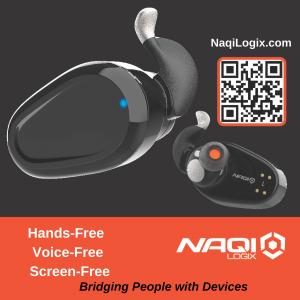Naqi Logix Announces Formation of Technical Advisory Board to Support Commercialization and Innovation Strategy
VANCOUVER, BC, CANADA, April 10, 2025 /EINPresswire.com/ -- Naqi Logix, a pioneering neuro technology company known for its non-invasive neural earbud, today announced the formation of its Technical Advisory Board, a distinguished panel of experts assembled to help guide the company through its next phase of technical development, scaling, and commercialization.
The Technical Advisory Board brings together renowned professionals across neuroscience, biomedical engineering, embedded systems, AI, and product innovation. As Naqi prepares to bring its breakthrough human-machine interface technology to market, these experts will provide critical guidance on product architecture, system integration, clinical strategy, and go-to-market readiness.
“The launch of our Technical Advisory Board marks a strategic milestone as we advance from prototype to commercialization,” said Mark Godsy, CEO of Naqi Logix. “Each of these individuals brings a depth of knowledge and leadership in their domain that will strengthen our innovation roadmap, operational strategy, and partner collaborations.”
Members of Naqi’s inaugural Technical Advisory Board include:
Dr. Sushmee Badhulika, Professor of Electrical Engineering at IIT Hyderabad, is an internationally recognized expert in wearable electronics, flexible sensors, and nanotechnology. She holds 270+ publications, 12 patents, and serves on editorial boards of leading journals including IOP, Springer, and Elsevier.
Dr. Nathan Zasler, MD, is a globally respected clinician and thought leader in neuro rehabilitation. He serves as Medical Director of Concussion Care Centre of Virginia and Tree of Life, and is a prolific author and editor with over 200 peer-reviewed articles and 60 book chapters focused on brain injury medicine.
Dr. Mario Palumbo, Systems Engineering Manager at ASUS Tech USA and former senior engineering leader at Intel, brings over two decades of experience in AR, wearables, embedded systems, and signal processing. He holds a PhD in physics from Purdue University.
Tony Kau, a veteran in AI hardware, edge computing, and global product strategy, has held senior roles at Intel, Micron, Samsung, and TE Connectivity. His leadership in data center and AI platforms brings valuable insight as Naqi expands across enterprise and consumer applications.
Chris Passier, an executive with over 35 years in product development across telecom, wireless protocols, and embedded systems, has held leadership roles at Nortel, Ericsson, Dell, and multiple startups. He holds multiple patents in optical and low-power technologies.
Aly Sidi, CTO of tinyCo and former leader at RailVision, Samsung, and Generac, is an expert in distributed systems, infrastructure architecture, and scalable software platforms. His background in AI-powered platforms and clean tech aligns with Naqi’s mission of building universally accessible interfaces.
"By leveraging the collective strength of this board, we accelerate the journey from vision to reality," said Sandeep Arya, Chief Business Officer of Naqi Logix. This combined expertise will help shape the way Naqi’s neural interface is adopted in healthcare, accessibility, consumer electronics, and beyond. As Naqi Logix continues to advance toward commercialization, the Technical Advisory Board will work closely with leadership to validate systems architecture, inform clinical pathways, and support strategic technical partnerships.
About Naqi Logix
Naqi Logix is a leading neuro tech company dedicated to creating technologies that bridge people and devices. With a portfolio of innovative neural wearables, Naqi provides intuitive, hands-free, and voice-free solutions for controlling devices, opening new avenues for interaction in gaming, accessibility, healthcare, and more. www.naqilogix.com.
For media inquiries or technical interviews: contact: outreach@NaqiLogix.com
For business and investor information: info@NaqiLogix.com
Jami Lah
Naqi Logix Inc
email us here
Legal Disclaimer:
EIN Presswire provides this news content "as is" without warranty of any kind. We do not accept any responsibility or liability for the accuracy, content, images, videos, licenses, completeness, legality, or reliability of the information contained in this article. If you have any complaints or copyright issues related to this article, kindly contact the author above.
Intercultural Connections Awards 2025 Announces Winners at the Edinburgh Festival Fringe
Patent Services USA Launches National Inventor Education Initiative to Help 10,000 Inventors Nationwide
Automotive Interior Trims Market to Reach USD 21.1 Bn by 2035, Driven by Comfort, Customization & Sustainability Trends
Więcej ważnych informacji
 Jedynka Newserii
Jedynka Newserii

 Jedynka Newserii
Jedynka Newserii

Farmacja

Nowy pakiet farmaceutyczny ma wyrównać szanse pacjentów w całej Unii. W Polsce na niektóre leki czeka się ponad dwa lata dłużej niż w Niemczech
Jeszcze pod przewodnictwem Polski Rada UE uzgodniła stanowisko w sprawie pakietu farmaceutycznego – największej reformy prawa lekowego od 20 lat. Ma on skrócić różnice w dostępie do terapii między krajami członkowskimi, które dziś sięgają nawet dwóch–trzech lat. W Unii Europejskiej wciąż brakuje terapii na ponad 6 tys. chorób rzadkich, a niedobory obejmują również leki ratujące życie. Nowe przepisy mają zapewnić szybszy dostęp do leków, wzmocnić konkurencyjność branży oraz zabezpieczyć dostawy.
Handel
Wzrost wydobycia ropy naftowej nie wpłynie na spadek cen surowca. Kierowcy jesienią zapłacą więcej za olej napędowy

Sierpień jest trzecim z rzędu miesiącem, gdy osiem krajów OPEC+ zwiększa podaż ropy naftowej na globalnym rynku; we wrześniu nastąpi kolejna zwyżka. Kraje OPEC, zwłaszcza Arabia Saudyjska, chcą w ten sposób odzyskać udziały w rynku utracone na skutek zmniejszenia wydobycia od 2022 roku, głównie na rzecz amerykańskich producentów. Nie należy się jednak spodziewać spadku cen ropy, gdyż popyt powinien być wysoki, a pod znakiem zapytania stoi dostępność ropy z Rosji. Nie zmienia to faktu, że jesienią ceny paliw na stacjach zazwyczaj rosną, a w największym stopniu podwyżki dotyczyć będą diesla.
Nauka
Szacowanie rzeczywistej liczby użytkowników miast dużym wyzwaniem. Statystycy wykorzystują dane z nowoczesnych źródeł

Różnica między liczbą rezydentów a rzeczywistą liczbą osób codziennie przebywających w Warszawie może sięgać nawet niemal pół miliona. Rozbieżności są dostrzegalne przede wszystkim w dużych miastach i ich obszarach funkcjonalnych. Precyzyjne dane populacyjne są tymczasem niezbędne w kształtowaniu usług społecznych i zdrowotnych, edukacyjnych, opiekuńczych, a także w planowaniu inwestycji infrastrukturalnych. W statystyce coraz częściej dane z oficjalnych źródeł, takich jak Zakład Ubezpieczeń Społecznych, są uzupełniane o te pochodzące od operatorów sieci komórkowych czy kart płatniczych.
Partner serwisu
Szkolenia

Akademia Newserii
Akademia Newserii to projekt, w ramach którego najlepsi polscy dziennikarze biznesowi, giełdowi oraz lifestylowi, a także szkoleniowcy z wieloletnim doświadczeniem dzielą się swoją wiedzą nt. pracy z mediami.










.gif)

 |
| |
| |
|